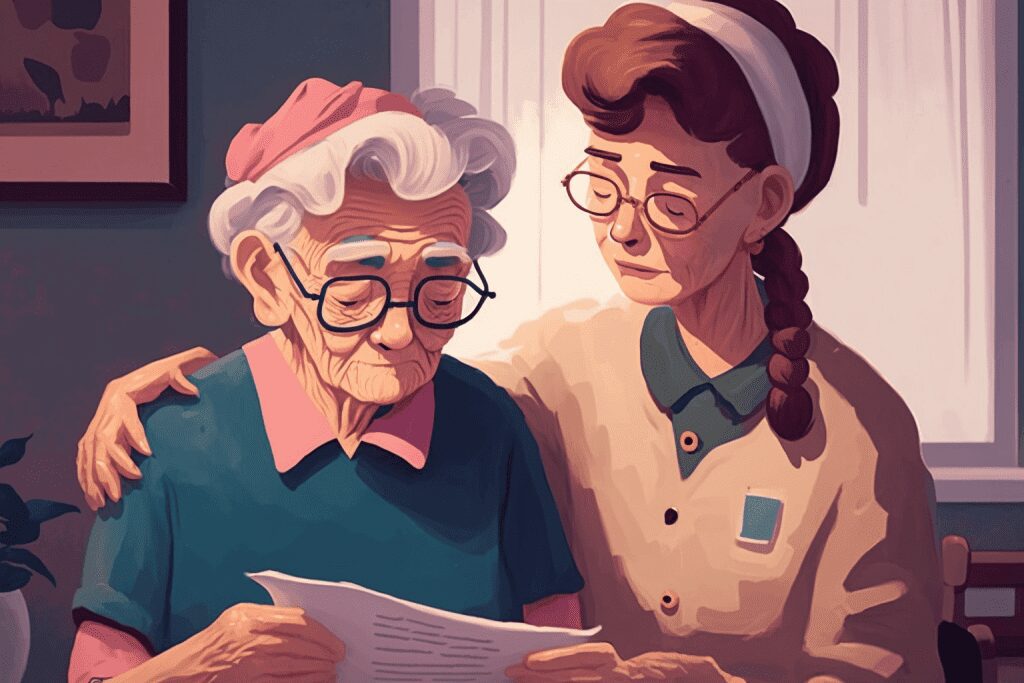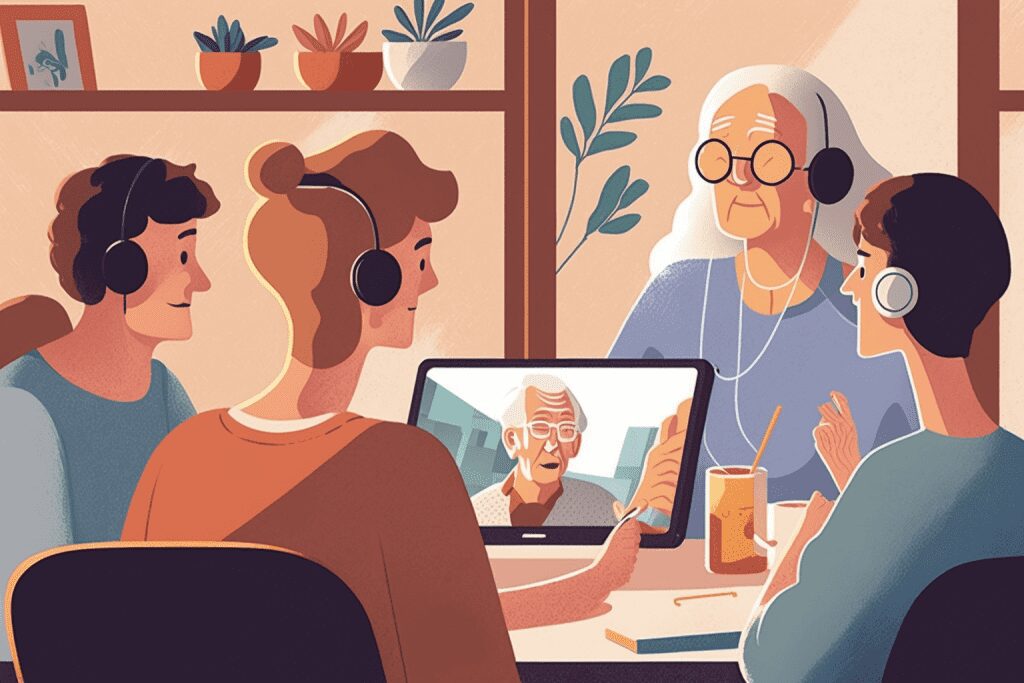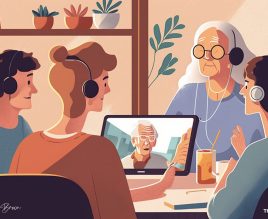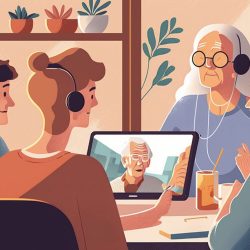Table of Contents
ToggleThe aging population is increasing at an unprecedented rate, and with it comes the challenge of providing adequate care for seniors. Elderly care has always been a pressing issue, but the current COVID-19 pandemic has become even more challenging. Seniors are the most vulnerable to the virus and require additional support and care to stay healthy and safe. Senior care technology has emerged as a solution to this problem, offering innovative and effective ways to care for the elderly.
Providing care for the elderly is a complex issue involving various challenges. As people age, they become more susceptible to chronic diseases, physical limitations, and mental health issues. In addition, many seniors are socially isolated and lack adequate support from family members and caregivers.
Caregiving can be daunting and physically demanding, particularly for family members who may lack the necessary skills and resources to provide adequate care. The shortage of healthcare professionals and the high cost of care are also significant challenges.
This article explores the future of senior care technology and its impact on elderly care. It will discuss the types of senior care technology available, their benefits, and their implementation challenges.
Types of Senior Care Technology

As our population ages, the need for innovative solutions to support seniors in maintaining their health, safety, and independence becomes increasingly important. Senior care technology has emerged as a rapidly growing field, offering various tools and devices to address these needs. From wearables that monitor vital signs to systems that provide assistance with daily activities, these technologies are transforming the way seniors receive care and support.
Wearables for Seniors
Wearable devices have become increasingly important in the realm of senior care technology, as they offer a convenient way for seniors to monitor their health and safety. Designed to be worn on the body, these devices come equipped with various sensors that track health parameters, providing valuable data to both seniors and their caregivers. Some common types of wearables for seniors include health monitoring devices, fall detection wearables, and GPS trackers.
1. Health Monitoring Devices
Health monitoring devices are a type of wearable technology specifically designed to track vital signs and other health parameters in real-time. By monitoring factors such as heart rate, blood pressure, respiratory rate, and even sleep patterns, these devices can provide valuable data to healthcare providers. This information can be instrumental in early diagnosis and treatment of various conditions, thereby helping to prevent complications and hospitalizations. Furthermore, health monitoring devices offer a non-invasive way for seniors to keep an eye on their well-being, potentially encouraging them to take a more active role in managing their health.
2. Fall Detection Wearables
Another important category of senior care technology is fall detection wearables. These devices are designed to recognize when a senior experiences a fall and subsequently send an alert to caregivers or emergency responders. As falls are a significant risk for seniors, and can often lead to injuries or hospitalizations, timely intervention is crucial. Fall detection wearables not only help seniors maintain their independence, but also provide peace of mind to family members and caregivers, knowing that their loved ones have an added layer of protection against potentially dangerous situations.
3. GPS Trackers
GPS trackers are wearable devices that enable caregivers to monitor the location of seniors, particularly those with dementia or other cognitive impairments who may be prone to wandering off and getting lost. By providing real-time location data, GPS trackers can help caregivers quickly locate seniors who have strayed from their designated areas, reducing the risk of injury or other complications. In addition to their practical applications, these devices can also offer a sense of security to seniors and their loved ones, knowing that help is never far away if needed.
Smart Homes for Seniors
Smart home systems have become increasingly popular as a form of senior care technology. They are specifically designed to integrate seamlessly into a senior’s home, providing valuable assistance with daily tasks and activities. These smart home systems for seniors encompass a range of features, such as voice-activated assistants, smart sensors, and automated home security systems, all of which work together to improve the lives of seniors and ensure their safety and comfort.
1. Voice-Activated Assistants
Voice-activated assistants, including popular options like Amazon’s Alexa and Google Home, can offer seniors a helping hand with numerous tasks, such as setting reminders, controlling home appliances, and providing information. These voice-activated assistants are especially beneficial for seniors who may have mobility or cognitive impairments, as they can help them maintain their independence and enhance their overall quality of life without the need for constant human intervention.
2. Smart Sensors
By placing smart sensors strategically throughout a senior’s home, it is possible to monitor their movements and daily activity patterns. These sensors can detect critical events, such as when a senior has fallen, left their home unexpectedly, or failed to take their prescribed medication. With real-time alerts sent directly to caregivers or family members, smart sensors enable timely intervention and support when it is needed most, ensuring the well-being of seniors.
3. Automated Home Security Systems
Automated home security systems are designed with the specific purpose of keeping seniors safe from potential intruders and other threats. These systems often incorporate features such as motion sensors, cameras, and alarms, which work in tandem to provide a comprehensive security solution. Automated home security systems not only offer seniors peace of mind but also ensure that they feel secure and protected in their own homes.
Telemedicine for Seniors
Telemedicine is an innovative form of senior care technology that provides remote medical consultations and monitoring services. By enabling seniors to access medical care without leaving the comfort of their homes, telemedicine helps minimize the risk of exposure to infectious diseases. Telemedicine services for seniors include virtual doctor’s appointments and remote health monitoring services.
1. Virtual Doctor’s Appointments
Virtual doctor’s appointments offer a convenient way for seniors to consult with their healthcare providers from the comfort of their homes. Using video conferencing technology, seniors can communicate directly with their doctors, receive medical advice, and discuss treatment options. By eliminating the need to travel to a medical facility, virtual doctor’s appointments save seniors both time and money, while also reducing their risk of exposure to infectious diseases.
2. Remote Monitoring Services
Remote monitoring services utilize various sensors and devices to keep track of a senior’s health from a distance. These services can monitor vital signs, detect falls, and even provide medication reminders. By allowing healthcare providers to diagnose and treat conditions early, remote monitoring services can help prevent complications and hospitalizations, ensuring that seniors receive the care they need when they need it. This proactive approach to healthcare can contribute to an improved quality of life for seniors and help them maintain their independence for longer.
Benefits of Senior Care Technology

Senior care technology offers a variety of benefits for seniors and their caregivers. These benefits include increased safety and security, improved health and wellness, enhanced independence and autonomy, reduced healthcare costs, and greater social connections and engagement.
Increased Safety and Security
Senior care technology can provide seniors with increased safety and security. Wearable devices can detect falls and send alerts to caregivers, while smart home systems can detect intruders and other threats. Automated home security systems can also give seniors peace of mind and ensure they feel safe in their homes.
Improved Health and Wellness
Senior care technology can help seniors maintain their health and wellness. Health monitoring devices can track vital signs and provide real-time feedback to healthcare providers, allowing for early diagnosis and treatment. Telemedicine services can also give seniors access to medical care without leaving their homes, reducing the risk of exposure to infectious diseases.
Enhanced Independence and Autonomy
Senior care technology can help seniors maintain their independence and autonomy. Voice-activated assistants can assist with daily tasks, while smart home systems can provide assistance with daily activities. Wearable devices can also help seniors live independently while providing peace of mind to their loved ones.
Reduced Healthcare Costs
Senior care technology can help reduce healthcare costs by preventing hospitalizations and reducing the need for in-person medical consultations. Remote monitoring services can detect and treat conditions early, preventing complications and hospitalizations. Telemedicine services can also reduce the need for in-person medical consultations, saving seniors time and money.
Greater Social Connections and Engagement
Senior care technology can also help seniors maintain social connections and engagement. Voice-activated assistants can provide companionship and entertainment, while telemedicine services can provide seniors with access to mental health support. Social isolation is a significant problem among seniors; senior care technology can help mitigate its effects.
Challenges of Senior Care Technology
While senior care technology offers many benefits, it also poses several challenges. These challenges include technological literacy and accessibility, data privacy and security, ethical considerations, and integration with traditional healthcare systems. Here are further details on these challenges:
Technological Literacy and Accessibility
Many seniors lack the technological literacy necessary to use senior care technology effectively. They may need help with setting up devices or using them correctly, which can limit their benefits. Additionally, seniors with physical or cognitive impairments may find it challenging to use certain devices, which can limit their independence and autonomy.
Data Privacy and Security
Data privacy and security are significant concerns in senior care technology. Many devices collect and store sensitive personal information, which can be vulnerable to cyber-attacks and data breaches. Ensuring the security and privacy of seniors’ data is crucial to maintaining their trust in senior care technology.
Ethical Considerations
Ethical considerations are also important in senior care technology. For example, using GPS trackers to monitor seniors’ movements can raise concerns about privacy and autonomy. Considering the ethical implications of senior care technology and ensuring its use respects seniors’ rights and dignity is essential.
Integration with Traditional Healthcare Systems
Senior care technology also faces challenges in integrating with traditional healthcare systems. Many healthcare providers may be unfamiliar with senior care technology, which can limit its adoption. Additionally, there may be challenges in integrating data from senior care technology with electronic health records and other healthcare systems.
Case Studies of Successful Senior Care Technology Implementation

Several companies have successfully implemented senior care technology solutions to make life easier and more manageable for senior and older individuals. These companies include CarePredict, Philips Healthcare, GrandCare Systems, and many more. Here is some information about these implementations.
CarePredict
CarePredict is a company that uses wearable devices and artificial intelligence to monitor seniors’ health and well-being. Their product, Tempo, can track a senior’s activity, sleep, and social interactions, providing real-time insights to caregivers. CarePredict has shown promising results in reducing hospitalizations and improving seniors’ quality of life.
Philips Healthcare
Philips Healthcare offers a range of senior care technology solutions, including health monitoring devices and telemedicine services. Their products include the Philips Lifeline medical alert system, which can detect falls and send alerts to caregivers, and the Philips care companion. This telemedicine platform allows seniors to consult with their healthcare providers remotely.
GrandCare Systems
GrandCare Systems is a company that provides smart home systems for seniors. Their products include a touchscreen device that can control home appliances and receive reminders and sensors that can detect falls and other events. GrandCare Systems has shown promising results in improving seniors’ quality of life and reducing the need for in-person care.
The Future of Senior Care Technology

The future of senior care technology is indeed promising, with numerous advancements in various fields poised to revolutionize the way we care for the elderly. Artificial intelligence will play a significant role in monitoring seniors’ health, analyzing data, and predicting potential health issues, enabling more proactive care.
Advancements in Artificial Intelligence
Artificial intelligence is a promising area for senior care technology. Machine learning algorithms can analyze data from wearable devices and other sensors to identify patterns and provide real-time insights to healthcare providers. Additionally, artificial intelligence can be used to develop virtual assistants that can interact with seniors and provide companionship and support.
Virtual and Augmented Reality
Virtual and augmented reality technologies have the potential to revolutionize senior care. They can be used to provide immersive experiences that improve seniors’ mental health and well-being. Virtual and augmented reality can also provide virtual tours of healthcare facilities, enabling seniors to familiarize themselves with medical procedures and reduce anxiety.
Robots for Elderly Care
Robots are another area of senior care technology that is rapidly advancing. They can be used to provide companionship and support to seniors and assist with daily tasks like cleaning and cooking. Additionally, robots can monitor seniors’ health and well-being, providing real-time feedback to healthcare providers.
Personalized Healthcare and Medicine
Personalized healthcare and medicine are also promising areas for senior care technology. Advances in genetics and other fields can allow healthcare providers to tailor medical treatments to individual patients’ needs. Additionally, personalized medicine can enable healthcare providers to diagnose and treat conditions earlier, preventing complications and hospitalizations.
Criticisms of Senior Care Technology
While senior care technology offers many benefits, it also faces criticisms. These criticisms include overreliance on technology, human interaction and emotional connection, and the generational divide in technology use. Let’s delve into some of the primary criticisms.
Overreliance on Technology
Critics contend that seniors’ overreliance on technology might erode their independence and autonomy. They maintain that seniors could become excessively dependent on wearable devices and other technological aids, inhibiting their ability to live self-reliantly and make their own decisions.
Human Interaction and Emotional Connection
Another criticism surrounding senior care technology involves the potential reduction of human interaction and emotional connection. Detractors assert that seniors require personal interactions and emotional support from other people, which cannot be fully replicated or replaced by technology alone.
Generational Divide in Technology Use
Lastly, the generational divide in technology use may pose challenges to the effectiveness of senior care technology. A considerable number of seniors might be unfamiliar with or have a negative attitude toward modern technology, potentially hindering their willingness to embrace and benefit from advancements in senior care technology. This could lead to disparities in access to quality care and support for the elderly population.
Conclusion
Senior care technology offers innovative and effective solutions to the challenges of elderly care. It includes many products, from wearable devices to smart home systems and telemedicine services. Senior care technology offers many benefits, including increased safety and security, improved health and wellness, enhanced independence and autonomy, reduced healthcare costs, and greater social connections and engagement.
However, it also faces challenges, including technological literacy and accessibility, data privacy and security, ethical considerations, and integration with traditional healthcare systems. Future developments in artificial intelligence, virtual and augmented reality, robots for elderly care, and personalized healthcare and medicine show promise in advancing senior care technology.
Want to learn more about senior care? Click here.
FAQs
What is senior care technology?
Senior care technology encompasses a range of innovative solutions aimed at providing care and support for the elderly population. These technologies focus on enhancing the quality of life and well-being of seniors, addressing various needs such as safety, health, communication, and social engagement. Examples of senior care technology include wearable devices for monitoring health, smart home systems for automating daily tasks and ensuring safety, telemedicine services for remote healthcare consultations, and applications for social connectivity and mental stimulation.
How does senior care technology benefit the elderly?
Senior care technology provides a multitude of benefits to the elderly, enabling them to maintain greater independence and an enhanced quality of life. These benefits encompass increased safety and security through smart home systems and wearable devices that monitor seniors’ movements, detect falls or emergencies, and provide timely assistance.
What are the challenges of implementing senior care technology?
Despite its numerous benefits, implementing senior care technology faces several challenges. Technological literacy and accessibility are significant concerns, as some elderly individuals may struggle to use new technologies or adapt to changes in the devices they use. Data privacy and security issues is another challenge in implementing senior care technology.
What are some examples of successful senior care technology implementation?
Several companies and products have showcased successful implementation of senior care technology. For instance, CarePredict has developed a wearable device that tracks seniors’ daily activities, identifies patterns, and alerts caregivers of potential health issues. Philips Healthcare offers a suite of remote patient monitoring solutions and telehealth services, catering to the needs of seniors and their caregivers.
What is the future of senior care technology?
The future of senior care technology appears to be bright, with ongoing advancements in various fields set to revolutionize elderly care. Artificial intelligence promises to improve decision-making and customize care plans for seniors based on their individual needs and preferences through AI-powered algorithms and predictive analytics. Virtual and augmented reality technologies have the potential to offer immersive experiences for mental stimulation, physical therapy, and social engagement.
References
- https://www.carepatrol.com/
- https://healthtechmagazine.net/
- https://digitalsalutem
- https://appinventiv.com/


















3 Comments
[…] Also read: The Future of Senior Care: How Technology is Revolutionizing Elderly Care […]
[…] Also read: The Future of Senior Care: How Technology is Revolutionizing Elderly Care […]
[…] measures. Balancing the immense potential of AI with these complexities is crucial for the technology to truly benefit seniors and revolutionize elder […]